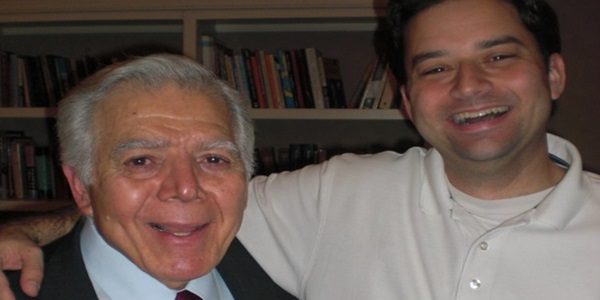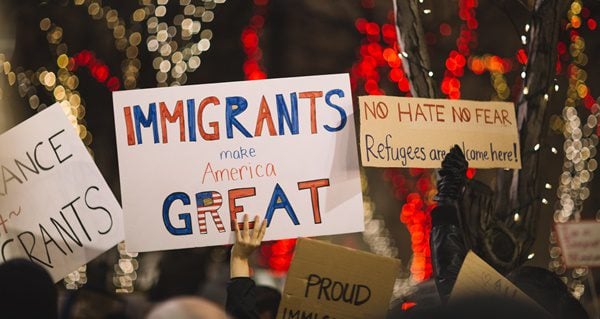 Suspicion of Islam is in the air throughout the United States. That suspicion was already there, but President Trump has added fuel to the fire with statements like, “I think Islam hates us. There’s something there. It’s tremendous hatred.” According to the president, it’s not just certain Muslims, but all of Islam hates the United States. When it comes to hatred, Donald Trump and his close administrative allies would have you believe that your Muslim neighbor is no different than a member of ISIS.
Suspicion of Islam is in the air throughout the United States. That suspicion was already there, but President Trump has added fuel to the fire with statements like, “I think Islam hates us. There’s something there. It’s tremendous hatred.” According to the president, it’s not just certain Muslims, but all of Islam hates the United States. When it comes to hatred, Donald Trump and his close administrative allies would have you believe that your Muslim neighbor is no different than a member of ISIS.
Trump wants you to believe that Islam equals violence, and Muslims are pouring through our borders. Soon they will demand Sharia and destroy our way of life.
Indeed, fear of Islam is spreading, but that fear is unfounded. As Stephen Walt of foreignpolicy.org explains,
There’s only one thing wrong with this view as a template for U.S. foreign policy: It’s completely at odds with reality … If this view became the primary organizing principle of U.S. foreign policy, it would commit the United States and its allies to a costly, self-fulfilling and counterproductive crusade that will play right into the hands of the handful of genuine extremists that do exist.
I know Walt is correct. Trump and his administration are completely at odds when it comes to the reality of Islam. It’s important to explain this truth, but explanations are not enough. We need more. We need relationships.
I wish there were another way to move us beyond our cultural fears. But from experience and observation of human nature, it seems that there is no other way beyond those fears than to seek friendships with Muslims.
Overcoming Fear through Friendship
I wish there were another way because seeking friendships with Muslims requires many of us to move beyond our comfort zones. It means we stop listening to the fearful voice of the president and start listening to the voice of our Muslim neighbors. When we do, we will discover that our lives open to become much bigger and richer than ever before.
My comfort zone was radically expanded by Esmail Koushanpour. I wish I could have introduced you to my dear friend Esmail. He was not just the best that Islam had to offer; he was the best humanity had to offer.
Esmail passed away on February 12 at age 82. He was born in Iran. When he was 16, he emigrated to England, where he studied at Oxford University. He told me that before he left Iran, his dad looked him in the eyes and gave him one last piece of advice: “Never point your finger to accuse another person. For when you do, you have three fingers pointing back at you.”
Esmail lived by his father’s advice. He was deeply devoted to his family and his community. His guiding principles came from his religion – Islam.
Healing Body and Soul with Justice
Islam motivated Esmail not to accuse his fellow human beings, but to help them. He was a physician and a professor of medicine for 36 years at Northwestern University’s Feinberg School of Medicine. He researched and taught others how to heal the body. But he also spent a lifetime healing souls.
As a devout Muslim, Esmail was dedicated to the pursuit of justice. But justice for Esmail was not connected to revenge. It wasn’t about pointing his finger against the “bad guys.” He was much more interested in a justice that heals.
Esmail was the executive director of the Islamic Cultural Center of Greater Chicago for eight years. He led the Muslim community to work with other faith groups and labor unions in efforts to help the working poor of Chicago. He also fought to expand health care to 180,000 people in Illinois.
I met Esmail in 2008 during an interfaith conference produced by the Raven Foundation called, “The Origins of Sacred Violence.” A few years later, we wrote an article for the journal Liturgy titled “Learning, Serving … Praying?: A Christian-Muslim Conversation.” Then he joined seven other participants at the Raven Foundation for a recorded Peace Circle event. I remember listening to Esmail’s deep commitment to Islam, a commitment that opened him to seek friendships with everyone he met. That is not an exaggeration. Esmail bubbled over with a joy that he could not contain. It was infectious.
Becoming Better with Each Other
I often asked Esmail to explain Islam to me. Interestingly, he was hesitant. “The Qur’an says that there is no compulsion in religion,” he told me. He feared that if he were to explain Islam to me, he would be compelling me to become a Muslim. But he didn’t want me to convert. He wanted me to become a better Christian.
And because of Esmail, I became a better Christian. He modeled for me a dedication to faith without having any hostility towards another. Instead, his commitment to Islam guided him in seeking justice and love for his neighbors.
So please, let’s stop believing the lies about Islam. Fear of Muslims traps us into our small comfort zones of hostility. Let’s move beyond those zones and seek friendships with one another. Those friendships are the foundations for a better world.
For more on interfaith friendship, read Lindsey Paris-Lopez’s article “Interfaith Friendship Will Save the World.“
Stay in the loop! Like Teaching Nonviolent Atonement on Facebook!











